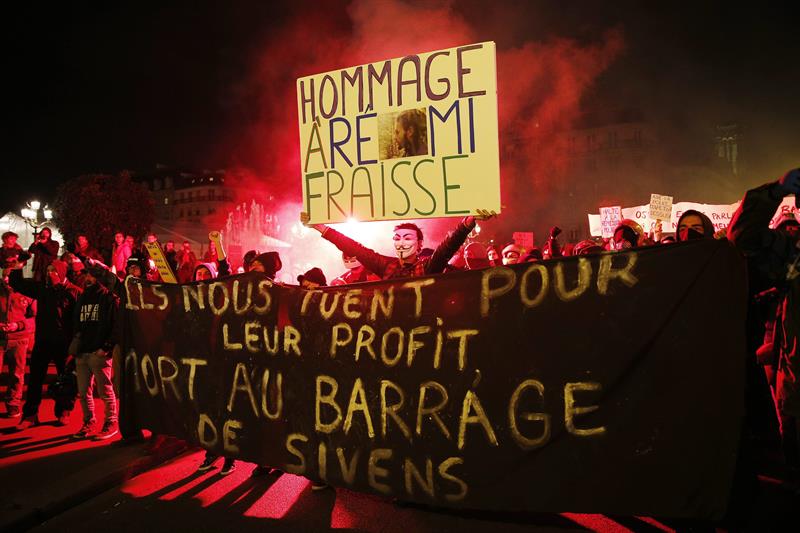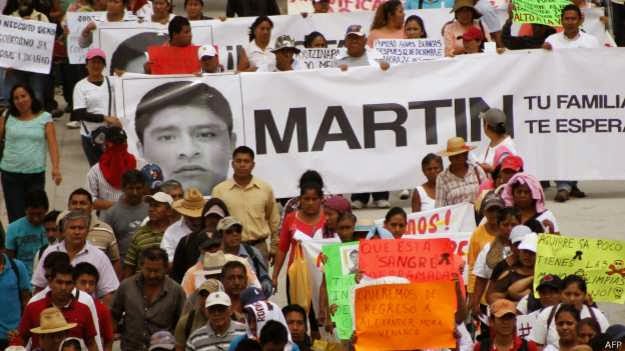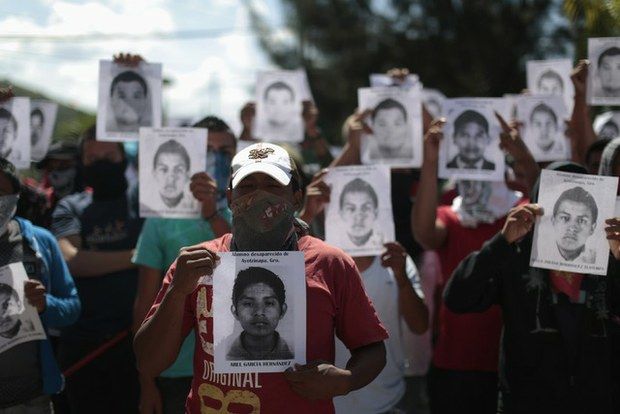Political statement from the LTS
The December 1 repression and the struggle for the release of the political prisoners
12/01/2013
By LTS-CC, Mexico
The PRD in the DF: A repressive government of the bosses
From the Liga de Trabajadores por el Socialismo, we greet the release of the 14 male and female prisoners from the North Prison and from Santa Maria Prison, as a first step in the struggle for their unconditional freedom. This is a result of the national and international mobilization of social organizations, collectives, human rights, students’, workers’, and parents’ organizations, as well as the actions carried out by the prisoners themselves and legal assistance from the lawyers of the December 1 League.
The brutal repression on December 1 against those who were protesting because of the imposition of Peña Nieto in the Presidency of the country, clearly showed the bourgeois character of the PRD and its repressive policy for safeguarding the interests of the dominant class in the DF. This is the intensification of the policy promoted by Marcelo Ebrard, based on the advice of Rudolph Giuliani, the reactionary Mayor of New York, who, from 1994 to 2002, imposed the “zero tolerance” policy in the heart of imperialism, with which the PRD in the capital prepared to govern the residents of the city, with a firm hand, essentially against the activist oppositional movements, at the same time that he was showing the Corporate Coordinating Council [CCE] and the dominant class in general, that the PRD would seriously defend capitalist property.
For that reason, Marcelo Ebrard was the favorite candidate of the businessmen and the Church in the past elections in the capital. The PRD’s repressive policy is part of the rightward drift of the regime, that, with the PRI’s return to the government, is attempting a strategic stance that will qualitatively modify the balance of power between the classes (as with the new labor law), by opening up a new stage of harsh, anti-popular plans against the working population. To that end, the government of alternating parties is seeking to toughen up the containment of social discontent that it cannot control through the “democratic” institutions of this democracy for the rich. So we will see fewer and fewer differences in the “security” policy of the three main parties of the Congress, despite the programmatic nuances that exist among them. Some, from the right, and others, from the “center-left,” share the capitalist plans demanded by the United States and the transnational corporations. The laws that penalize social protest under the offenses of “terrorism,” “incitement to violence,” and attacks on the “social peace,” are the mark of the authoritarianism that the PRI wants to impose with its return to power. For that reason, the budget expenditure for the army and the police corps and intelligence are very important for the government (like that of the national police which is 1.5 billion pesos, that the PRD did not object to in the Congress). And they all agree on strengthening the laws and the police against the working population, in order to give assurances to capital. This is the “modern left that makes proposals” that the “mutts” are demanding, that Peña Nieto needs as a guarantor of stability for the businesses of the rich, and that they had been agreeing on for months, in order to realize it in the reactionary and anti-worker “Agreement for Mexico.” This, against the illusions of the thousands that recently voted for this increasingly right-wing “left.” For that reason, in Peña Nieto’s inauguration, the PRI agreed with the PRD on a division of tasks to achieve an armored government transition, in which the repressive forces of the capital showed the toughness they will practice in this six-year term, against those who challenge the authoritarian and exploitative policy of the regime of alternating parties.
The first political prisoners of the PRD government in the capital
For almost a month, the DF government kept the political prisoners, who were harshly repressed, regardless of their innocence and the great popular discontent that this forceful measure provoked. An action that wore away the image of the PRD in the capital (a measure to which the national leadership of this party is not alien) and of the new chief of government of the capital, that, in this way, displays his subordination to the political line of his former chief Marcelo Ebrard. Amid the crisis that opened up in the PRD, because of the negotiation of its leadership with the PRI and Peña Nieto, in order to agree on a plan of governance in the country that will avoid situations of instability (through the “Agreement for Mexico”), this repression intensified the frictions among the tendencies of the PRD in opposition to the national leadership and to Ebrard-Mancera, leaving the role of the “democratic government” of the PRD in the capital very challenged. We must emphasize that the repressive policy of the PRD, although further to the right than previously, is not new, and that during the previous years, all the internal tendencies endorsed it, including Andrés Manuel López Obrador, who was the main guiding light for many years. Although these elements were added to the political decision to keep the December 1 prisoners as hostages of the PRD and PRI in prison, in order to inhibit social discontent, making that decision unsustainable and very difficult, the popular mobilization, that repudiated the repression and the provocation by the federal government and the local government, was the main force that determined the release of all those imprisoned. In such a way that even the very deputies from the PRD opted for paying the bail for those arrested, in order to pose as “democrats.” That is, the release of the political prisoners (a demand that was increasing, day by day) was not a gracious concession or pardon from a “sensitive” or “democratic” government. It was the result of pressure in the streets that was tending to become a national democratic movement for the release of the political prisoners (“Freedom for the political prisoners!” was the slogan that was raised in the 1968 student movement), which made keeping the comrades imprisoned very difficult, and facing which, the DF government chose a measure that allowed it to repair its image and recover credibility in front of the voters, thinking about the 2013 elections.
This was what led the legal and political apparatus of the PRD in the capital to seek an intermediate solution that, in modifying Article 362, which punishes protest as terrorism (euphemistically called “attacks on the public peace”), allowed releasing the prisoners, by leaving in ambiguity the new definition of the offense from that law, deceptively exchanging it for that simply of violence (thus generalizing the offense). But, in addition, in its interest in reducing discontent in the streets, the condemnations of international human rights organizations and the growth of the popular mobilization, Mancera’s government promised the December 1 Lawyers League (formed specifically to demand the release from prison of those arrested) that it would drop the charges against those arrested. However, once the release of the political prisoners was announced, the government of the DF ”forgot” its promise, and those arrested will have to follow the judicial procedures of the case. That is, it was a maneuver of Mancera, in order to keep the intimidating character of Article 362, which criminalizes discontent, at the same time that it seeks to look like a just government. However, despite Mancera’s propaganda, which seeks to convince people that his government is not repressive, it is obvious that its police, its judges and courts (at the request of the federal government) acted against those arrested, by violating the laws and their human rights, as Peña Nieto did in Atenco in 2006. The condemnation in the Ibero-American University (that gave rise to “#yosoy132”), alerted against this authoritarianism, that Peña Nieto was threatening to impose, in justifying the repression in Atenco.
The political cost that this repressive government of the bosses had to pay as part of the political agreement signed months ago by the leadership of the PRD with Peña Nieto’s “transition” team, is too much for a party of the center-left (increasingly right-wing), that seeks to distinguish itself from the PRI and the PAN, on the road to the Presidency in 2018. It so subordinated itself to the new PRI government (with which it is seeking to establish institutional relations), that the biggest criticism of the population is less against the PRI of the repressive Peña Nieto, than against the authorities of the DF, who, using the methods of the PRI, brought shock troops out to the street, that made people remember the hawks of June 10, 1971, from the “old regime.” This is a result of the agreement with Peña Nieto, that will allow the PRD to become part of the regime, as an ally (“a responsible opposition”) and less and less as the (institutional) “adversary” from the center-left that it was for several years.
An independent policy to achieve real freedom
Now that the political prisoners of December 1 have been released, it is necessary to get mobilized to achieve the repeal of Article 362 (the essence of which recalls Articles 145 and 145-bis under Díaz Ordaz), and the stay of the crimes alleged against the recently released comrades. The mobilization in the streets was what achieved the release of all the prisoners, combined with the action of the legal defense, and it is in that way that the absolute freedom of those released will be imposed. For that, it is necessary to promote a big national movement against repression, headed by the human rights organizations, the unions, next to the organizations of young people, students and the poor. Clearly, the government of the DF and the PRD assembly members of the capital will try to negotiate or influence the December 1 Lawyers’ League, in order to curb the mobilization through political maneuvers, to repair Mancera’s prestige and the deterioration of the PRD. The Lawyers’ League faces the challenge of distinguishing itself from a policy of gratitude to the repressive government of the DF, to the Legislative Assembly and the Deputies of the PRD for the departure of the prisoners, and acting with an independent line, alternative to those who will exert pressure for it to be functional for the plans of Mancera and the PRD’s electoral repositioning. The struggle against the repression of the regime as a whole, and of the PRD government of the DF, that has been making leaps in its drift to the right, demands acting with the most absolute political independence and devoid of any electoral interest.
From the LTS-CC (whose young activists make up the Socialist and Revolutionary Anti-capitalist Youth, and the Bread and Roses women’s group), from the first moment of the struggle for the liberation of the prisoners, we participated and gave our support. Next to thousands of activists and organizations, we participated in the mobilizations, actions condemning the arrests, fundraising, promoting the camps in front of the prisons, and we contributed our collaboration to the legal defense, adding the lawyers among our comrades to the December 1 League of Lawyers.
Mexico City, December 30, 2012


![Declaration of the Movimiento de los Trabajadores Socialistas [MTS] facing the brutal murder and disappearance of the normalistas students of Ayotzinapa](http://www.ft-ci.org/IMG/arton8590.jpg?1687978277)











